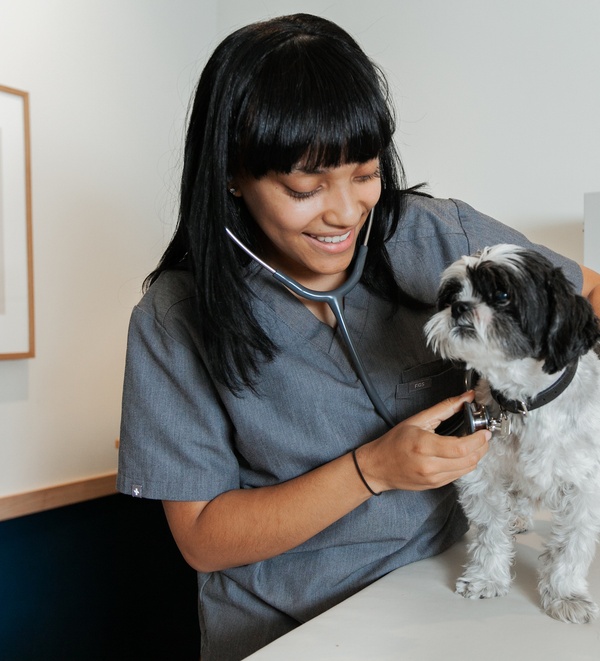
What To Do If Your Dogs Has Worms (And How to Prevent Them!)
Worms — a topic most people don't like to discuss, but should. This is because worms are a very important health consideration when it comes to dogs. This is because some of these parasites can cause problems — some severe — for humans, too, so it's important to protect everyone in the house.
The most common example is the roundworm, which normally inhabits the digestive tract but can migrate to other parts of the body, also known as visceral larva migrans. This is common in children and can lead to blindness, or problems with internal organs such as the liver, lungs, or central nervous system.
The good news is, we've got lots of options for parasite control these days. Preventing worms — and all of the problems that could come with them — can be very simple.
With that in mind, here are some important things to know about worms in dogs…
What types of intestinal worms do dogs get?
Dogs in the United States may be affected by roundworms, tapeworms, hookworms, and whipworms. Other worms may infect dogs, too, but are far less common.
For more information about each type of worm, visit the pet owner’s guide of the Companion Animal Parasite Council. But for now, we will focus on treatment and prevention. (We're focusing on internal parasites here, but read this piece for info about heartworms and here for info on ringworm, a fungal infection.)
What are the symptoms of worms or intestinal parasites in dogs?
Weight loss.
Diarrhea, sometimes with mucus or blood.
Vomiting.
Visible worms, full or worm segments, (or “proglottids,” small worm segments that look like cucumber seeds or grains of rice) in the stool or vomit. Proglottids may also be found on your pet’s fur, usually near their anal region.
A distended or “pot-bellied” stomach, especially in puppies.
Weakness, paleness, or poor growth, especially in puppies.
Flea exposure (because fleas carry tapeworms).
Some affected dogs might not show any symptoms, especially in the early stages.
How do dogs get worms?
From stool or the environment
Many intestinal worms spread their eggs via their host’s stool. So, if your dog is interested in the poop of other dogs, cats, and wild animals, they could get infected by ingestion.
Plus, wherever dogs or other animals go to the bathroom, worm eggs can be left behind on the ground or in the soil. Certain worm larvae (young worms) can also enter the body by burrowing into the skin. This means dogs can be at risk through contact with contaminated soil long after the poop is removed.
(Likewise, worm eggs in soil are a common way for human children to become infected, since many kids like to play in dirt and then put their hands into their mouths.)
From wildlife
Your dog can pick up certain types of worms by ingesting a smaller animal, such as a mouse, that’s infected. Your dog doesn’t have to be a natural hunter for this to happen — they might come across a dead animal during their walk and try to pick it up with their mouth.
From their mother
Puppies can contract certain worms directly from their mother, either in the womb or via the milk they drink while nursing. This is why parasite control is very important in pregnant pets.
From fleas
Some worms, particularly tapeworms, have a more complicated lifecycle. A tapeworm lives part of its life in one type of animal (most commonly fleas) and another part of its life in a larger animal (dogs, for example).
If an infected flea bites your dog and your dog turns around to lick the itchy area, he or she might accidentally swallow the flea, and that is how the tapeworm gets transmitted.
The good news is you can’t get tapeworms directly from your dog. But, wherever fleas are around, there is some risk of contracting the worms, too.
How are worms treated?
We know you might be grossed out by now. To avoid having to deal with worms, we have some tips for how to treat and prevent these nasty worm infections…
Worms may be diagnosed in a dog or puppy who is ill, or even in a pet with no symptoms at a routine checkup.
A stool test is a very important screening test for evidence of worms — that’s why stool tests are so commonly recommended at checkups.
If your dog is ever diagnosed with worms, your veterinarian will prescribe a deworming medication as treatment, depending on the specific parasite. If you're prescribed a dewormer, it's imperative to follow the directions. Not all dewormers are equal, and some work well for certain parasites and not others. Most must be repeated at specific time intervals (often 2-3 weeks apart) to be sure the worms are completely gone.
After a course of treatment, your veterinarian will follow up with another stool check to be sure the treatment was effective.
Can I prevent my dog from getting worms?
For most dogs, it’s recommended to take some type of worm prevention year-round. In fact, many heartworm preventive products also contain a dewormer for intestinal worms. Your veterinarian will let you know what's best, based on the worms found in your part of the country and your dog’s lifestyle.
In addition to medications, there are some behaviors to prevent worm infestations.
When your dog goes to the bathroom, be sure to pick up and throw away the poo immediately. This decreases the risk of worm eggs getting into your yard.
Avoid areas with high levels of feces from dogs, cats, or wild animals. Choose parks, trails, and beaches that are clean and well-managed. (This also goes for children’s sandboxes and playgrounds — look for clean facilities to decrease risks.)
Practice and teach children about good hygiene. That includes washing hands before eating, especially after playing in soil or sand, or handling pets.
Keep up with regular veterinary care, including stool checks and parasite prevention. This is especially important for puppies who are working through their vaccine checklist and building an immune system. Worms are very common in puppies and can make them very ill, even leading to death, so be sure to stay on time with vaccines and puppy dewormers.
These best practices should help prevent worms and make your home a “worm free zone" — for both the two-legged and four-legged inhabitants!
About the Author
